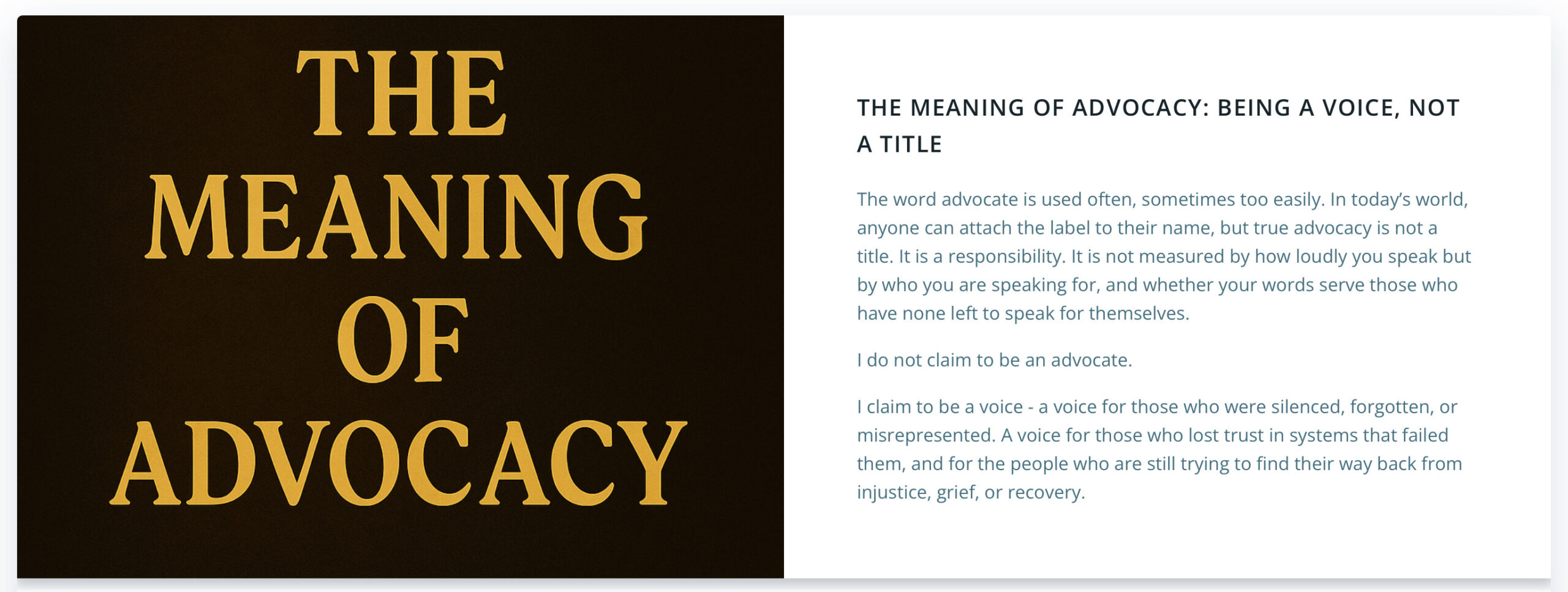The Meaning of Advocacy: Being a Voice, Not a Title

The word advocate is used often, sometimes too easily. In today’s world, anyone can attach the label to their name, but true advocacy is not a title. It is a responsibility. It is not measured by how loudly you speak but by who you are speaking for, and whether your words serve those who have none left to speak for themselves.
I do not claim to be an advocate.
I claim to be a voice – a voice for those who were silenced, forgotten, or misrepresented. A voice for those who lost trust in systems that failed them, and for the people who are still trying to find their way back from injustice, grief, or recovery.
Being a voice is not about recognition or reward. It is about standing up when silence feels safer. It means listening before speaking, and using truth as the foundation of every word. Real voices do not shout for attention; they speak so others can be heard.
Who Can Call Themselves an Advocate?
An advocate is not defined by a title, a platform, or a following.
An advocate is defined by action.
- An advocate stands beside others, not above them.
- An advocate listens more than they speak.
- An advocate takes risks, often quietly, for the sake of what is right.
- An advocate carries stories responsibly, not for clout or attention, but to bring truth into the light.
To claim the title of advocate is to carry a weight that not everyone understands. It requires humility, patience, and consistency. It demands integrity, especially when no one is watching.
Being a Voice Instead of a Title
I do not call myself an advocate because advocacy has become a brand. Too often, the word is used by people who exploit tragedy for validation, or who weaponize causes for influence. That is not advocacy; it is opportunism.
I choose to be a voice, because a voice can be shared, amplified, and joined by others. A voice is not owned. It belongs to the truth it speaks and to the people it represents.
Being a voice is not about how many posts you retweet or share. It is about what you have done. It is about how you have shown up when no one else would, how you have helped someone in silence, and how you have stood firm in truth even when it cost you something.
Real advocacy is not measured in likes, shares, or hashtags. It is measured in the impact you leave, the lives you touch, and the people you help when no one is watching.
To be a voice means showing up when others are afraid. It means using experience, empathy, and evidence to tell the stories that matter, even when they make people uncomfortable. It is not glamorous. It is not always safe. But it is real.
The Purpose of Being a Voice
The goal is not fame. It is impact.
The goal is not control. It is change.
Being a voice is about creating space for others to reclaim theirs. It is about helping survivors, families, and communities rediscover strength after being silenced by fear, loss, or manipulation.
The world does not need more self-proclaimed advocates.
It needs more people willing to speak truthfully, help quietly, and stand firmly when it matters most.
Final Thought
You do not need a title to make a difference. You need conviction.
You do not need recognition to speak truth. You need courage.
And you do not need to be an advocate to fight for others. You only need to care enough to be a voice that refuses to stay silent.